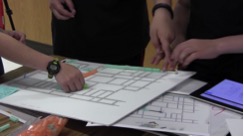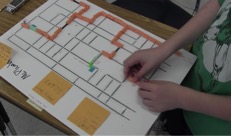Improvable Models as Priming Artifacts in Student Engineering Design Activities
| Event Date: | January 21, 2016 |
|---|---|
| Speaker: | Chandan Dasgupta |
| Speaker Affiliation: | Postdoctoral Research Assistant, Purdue University (Alejandra Magana) |
| Time: | 3:30 - 4:20 PM |
| Location: | Armstrong B071 |
| Priority: | No |
| College Calendar: | Show |
Within the last decade, there has been an increased emphasis on making engineering education accessible to K-12 students and focus on making students engineering enabled. Research in this area is in its early stages and further work is needed to advance our understanding of what it means to productively engage with the engineering design process. This research program investigates how the use of Improvable Models—models that can be iteratively redesigned and optimized by students—as priming artifacts for supporting productive engagement with the engineering design process. This presentation describes a research study involving sixth grade students who used two types of Improvable Models – Suboptimal System model and Optimal Component model. Suboptimal System model presented a complete solution that was suboptimal at the system level. Optimal Component model presented an incomplete solution that was optimal at the component level. The guiding research question was: How does the use of Improvable Models as priming artifacts influence students’ design of engineering solutions?
Findings indicated that students used the Improvable Models for productively engaging with five different disciplinary practices. However differences were identified when students used Suboptimal System model versus Optimal Component model. The first one scaffolded the formation of design heuristics, while the latter one promoted design fixation. Three kinds of verbal and written prompts—procedural, reflection, and disciplinary prompts—along with resources like a software simulator scaffolded engagement with the disciplinary practices.


Bio
Dr. Chandan Dasgupta is a Postdoctoral Researcher on the SmartCAD project in the ROCkETEd group (Research on Computing in Engineering and Technology Education) at Purdue University. Dr. Dasgupta received his Ph.D. in Learning Sciences from the University of Illinois at Chicago (UIC) where he was awarded the Chancellor’s graduate research fellowship for his dissertation work on scaffolding students' productive disciplinary engagement with engineering design activities using suboptimal models. His research interests include the use of counterexamples as primary generators for supporting productive disciplinary engagement, integration of design.
thinking and scientific inquiry into K-12 education, and designing learning environments that help students generate and use design heuristics and make effective tradeoff decisions. When he is not doing research work, Chandan likes to volunteer for a non-profit organization focused on making quality education accessible to socio-economically disadvantaged children in India.
